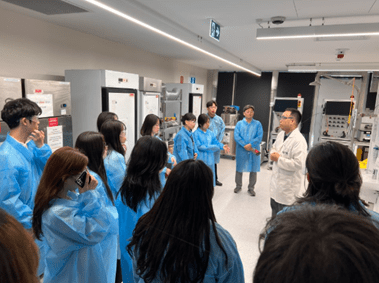Korean student chapter on the rise
July 10, 2025

AWWA Articles
Korean student chapter on the rise
The Korea University, Sejong Campus, an AWWA student chapter, is growing its membership, thanks to an emphasis on programming that connects students to industry and teaches them more about current challenges in the water sector.
When the chapter was established, leaders sought to provide a mix of academic and hands-on activities to appeal to a range of interests. In 2023, it joined forces with the Eco-up Convergence and Open Sharing System (COSS), a Ministry of Education program that trains future leaders in the environmental industry, to offer “meaningful experiences outside of the classroom,” said Youngjin Kim, chapter president. The chapter became a gateway for students to access these industry experiences.

Known locally as the Active Environmental Engineer Club (AEEC), the chapter focuses on water- and environment-related issues, but it has expanded to include programming on topics like climate change and sustainability.
“These flexible opportunities help students stay motivated and engaged,” Kim said.
Earlier this year, members visited Korea’s first commercial seawater desalination facility, which supplies approximately 11% of the industrial water for Gwangyang Steel Works, reportedly the largest steel facility in the world. The experience deepened students’ understanding of large-scale water infrastructure and sparked meaningful conversations about future water supply solutions, Kim said.
Last year, students visited Indonesia and Singapore to observe key environmental challenges in tropical regions, including water pollution, waste management issues, and deforestation. They also explored how Korea’s eco-friendly technologies could be applied to address these problems. The program aimed to deepen students’ understanding of global environmental issues and foster sustainable international cooperation, Kim said.
“The Korea University Sejong Campus chapter wants to empower students to address global water challenges and cultivate their growth into future leaders in international environmental engineering,” he said.
In addition to industry visits, the chapter hosts seminars. One event last year connected attendees with alumni who were working in the field, for an exchange of engineering ideas and advice on navigating careers in water.
“Student chapters are a crucial piece of the career pipeline in the water workforce,” said Mary Svoboda, who oversees programming for young professionals at AWWA. “They connect students to real-world applications of the concepts they’re learning in class — which, in turn, inspires careers in the water sector.”
Next year, chapter leaders are planning more global field trips, industry workshops, and international conferences. Some highlights include an on-site training program in Australia, which the Sejong Campus is facilitating, plus seminars and field trips about climate resilience and sustainable water management. The student chapter plans to prepare students in advance so they can get the most out of these programs.
And they will continue to enter competitions where possible. In 2024, they received the Ministry of Education Award at the Environmental Innovation Idea Contest for their proposal of the Zernich Filter, an eco-friendly filtration technology that enhances the removal of microplastics and harmful substances during water treatment.
The chapter now has 43 active members and is looking forward to adding more.
Is there a university in your area that would like to start an AWWA chapter? Email students@awwa.org.
Advertisement